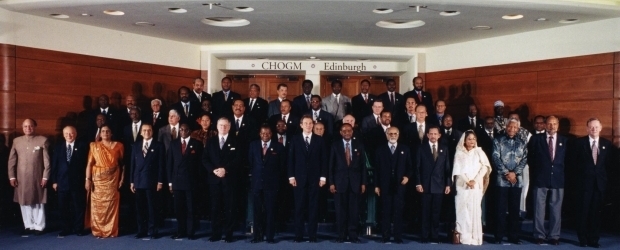 Commonwealth leaders at their 1997 Summit [photo: ComSec]
Commonwealth leaders at their 1997 Summit [photo: ComSec]
[As UK secret files were released from the UK’s National Archives this month, a dip into the Round Table archives takes a look into the relationship between Nelson Mandela, Margaret Thatcher and the Commonwealth. Here is an extract from an editorial by Stuart Mole as the editor of a December 2017 special issue of The Round Table: Commonwealth Journal of International Affairs. You can access the entire edition on the Journal website.]
Chief Emeka Anyaoku, who joined the nascent Commonwealth Secretariat in 1966, also played a prominent part in these important events as a Deputy Secretary-General. In 1990, however, his assumption of office as the Commonwealth’s third Secretary-General coincided with Mandela’s release from prison and a further phase in Mandela’s relationship with the Commonwealth. These were both the best—and the worst—of times for South Africa. Despite all the pitfalls, a near miraculous path to peaceful elections and change was opened up. At the same time, the final days of apartheid triggered violence and death on an unprecedented scale, almost suffocating all chances of peaceful agreement and reconciliation. In assisting South Africa to navigate change, overcome violence, and begin building a post-apartheid society, Anyaoku has a significant Commonwealth story to tell.
An intriguing element in South Africa’s transformation is its return to Commonwealth membership in 1994. This was by no means a forgone conclusion and certainly did not feature in the ANC’s earlier post-apartheid planning. Mandela’s ready support for the idea (which Oliver Tambo had also endorsed) probably explains its popularity. Others argue that it was the Commonwealth’s strength as a ‘network of networks’ that allowed South Africa—which had suffered isolation on so many levels during the apartheid years—to rapidly reconnect with the world.
Nor should the warmth of Mandela’s relationship with the Head of the Commonwealth, Queen Elizabeth, be discounted. In 1991, Mandela (then no more than the President of the ANC and a special guest at the Commonwealth’s Harare summit) had, with great charm and style, innocently gate-crashed the Queen’s banquet for Commonwealth Heads of Government. While courtiers reeled, the Queen immediately ordered that an extra place be laid close to her. She then paid a State Visit to South Africa in 1995 (the first royal visit since 1947) and returned for the Durban Commonwealth summit in 1999, in part to bid farewell to the retiring South African president. For his part, Mandela enjoyed a triumphant State Visit to the UK in 1996. As the South African journalist John Battersby has remarked: ‘He had a particular affinity with Queen Elizabeth. Having his own royal tribal lineage, he was completely at ease with her’.
The Anyaoku term also covered Mandela’s five years as South Africa’s president and, inevitably, as a Commonwealth statesman. Much is sometimes made of the importance of Thabo Mbeki, as the Deputy President, in effectively steering the ship of state. Mandela once self-deprecatingly remarked that he was merely ‘an ornament’. But, in truth, his authority was considerable and the turbulent relationship with Abacha’s Nigeria—and the changes that he encouraged in the Commonwealth in dealing with those who blatantly flouted its principles—was a major contribution, of significance beyond the Commonwealth.
This is familiar territory for Sir Don McKinnon, who was the fourth Commonwealth Secretary-General. As New Zealand’s Foreign Minister, and involved in the hosting of the 1995 Auckland summit, McKinnon observed these developments at close quarters. When the Nigerian crisis prompted the Commonwealth to establish guidelines for dealing with errant members (policed by a Ministerial Action Group of foreign ministers) McKinnon became its vice-chairman and was deeply involved in the Mandela presidential years, as the Commonwealth sought to establish its credentials as a values-based association. In this role, he played an important part in Nigeria’s return to democracy in 1999. Later, he grappled with other challenges to Commonwealth values, notably in Fiji and Zimbabwe, and worked with Thabo Mbeki, Mandela’s successor.
Professor Chris Saunders probes the UK-Commonwealth relationship and questions whether the great divide over sanctions can justifiably be the basis for assessing the sincerity of an individual’s or nation’s opposition to apartheid itself. Some see the UK as hopelessly compromised over apartheid and race because of its perceived economic and security interests. In resisting sanctions, Mrs Thatcher therefore becomes, in the eyes of her critics, an ally of President Botha and an apologist for apartheid. Others argue that Thatcher’s opposition to apartheid was sincere. In this vein, Saunders compares the respective roles of the UK and the Commonwealth in pressing for Mandela’s release from prison. He argues that Thatcher’s pressure on Botha to release Mandela was genuine and persistent, and arguably more effective than that of the Commonwealth collectively or other individual leaders. Thatcher was certainly influential, and played a decisive role in persuading Botha to accept the mission of the EPG and avoid placing obstacles in its path.
Related links:
Mandela and the Commonwealth – Stuart Mole (December 2017)
Thatcher dismissive of Mandela after phone chat, files reveal – The Independent (December 2018)
Mandela’s Freedom, the Commonwealth and the Apartheid Axis – Sir Shridath Ramphal (December 2017)



